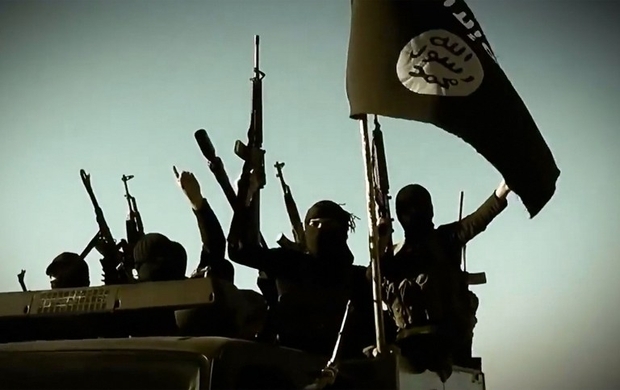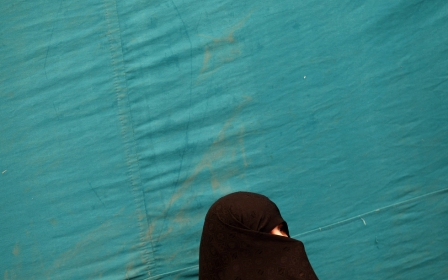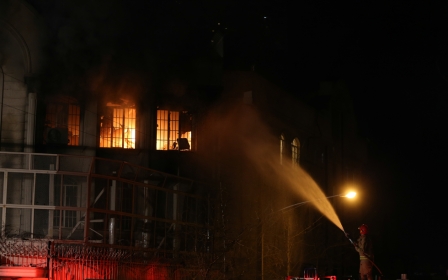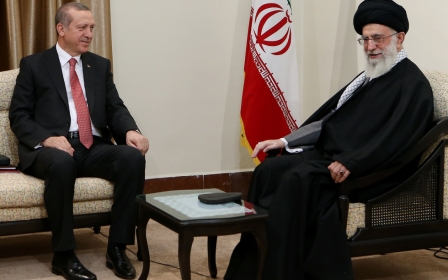Daesh is Daesh: Neither Iran nor Saudi Arabia resembles this death cult

An opinion article recently published in Middle East Eye drew an analogy between the self-proclaimed Islamic State (Daesh), and my country, Iran. The author argued that Daesh’s ideology, worldview and modus operandi closely resonate with those of Iran. The argument went that if the people who are alarmed by the atrocities of IS would like to imagine what will happen if this death squad establishes a real, fully fledged “state”, they’d better look at Iran.
I am familiar with the previous works of the author and can confidently assert that he is an accomplished and well-spoken writer and analyst. He has penned many interesting articles, including on such crucial issues such as Islamophobia, and tackled these concerns from inventive perspectives. However, I feel his approach to Iran and characterising it as a Daesh incarnate has been somewhat emotive and inaccurate. I also think, however, that those who liken Saudi Arabia to Daesh are failing to adhere to the truth.
His article generated a widespread debate on social media and in the comments section of the column. Some of the commentators were supportive of his argument. Others were naturally critical. However, there was yet another group that was abusive towards him. A lot of these abusive people would have no problem if Saudi Arabia (or other states that they don't like) were compared to Daesh. They cheer, share and promote such false comparisons. But if the tables are turned, and the comparison involves Iran, then they – hypocritically – express outrage.
Some of the abusive commentators turned on the website for publishing his work. I can say confidently that although the outlet has published many commentaries critical of the Iranian government, it has been providing a fair and balanced coverage of Iran in a professional manner. This is at a time where thousands of mainstream newspapers, news websites, TV and radio stations across the world are adopting a purely anti-Iran stance. Middle East Eye also has contributors from inside Iran who are able to provide firsthand, independent coverage of Iranian affairs without being under any malign influence.
I should assert that there’s literally “nothing” humane, civilized or honourable in Daesh's ideology or conduct. It’s true that Iran and Saudi Arabia do commit human rights abuses, but it doesn’t mean that they are torturous, murderous entities like Daesh, committed to killing, decapitating and raping people of different faiths, religions or genders on a daily basis. Iranian Foreign Minister Javad Zarif has acknowledged this, and said his government is ready to engage in dialogue about Iran’s human rights record with the international community.
But believe me, we cannot remind people of their mistakes and compel them to correct them by pouring scorn on them or embarrassing them. Both the governments of Iran and Saudi Arabia are serving their populations to different degrees, and trying to improve their people’s living standards. They aspire to have better relations with the outside world and much of their regional rivalry is rooted in their thirst for attracting more allies and partners and their keenness to court the global powers in the West and East – no matter how they try to make new friends and crush their enemies.
But when you talk about Daesh, you’re actually talking about a death squad which has nothing positive, constructive or encouraging in its workings and plans. To put it very simply, Iran and Saudi Arabia represent governments that are doing things which at least benefit thousands of people. Does Daesh do anything that even a single citizen on the earth can reap the benefits of? They’re plainly recruiting alienated and hapless youths to fight for them and kill at will. Daesh is predicated on killing and destroying. Can we compare such important countries as Iran and Saudi Arabia, with their historical and contemporary contributions to global arts, literature, sciences, economy and scholastic endeavours, with the Daesh terrorists?
I’m the first one who believes Iran should respect and uphold the rights of the political activists, ethnic and religious minorities and women in a dignified way and revise its policies, but the way to make it happen – if we really want to realise it – doesn’t pass through bombastic attacks on the Iranian government. No government finds it agreeable to be openly and pejoratively censured for its wrongdoings. Only respectful engagement will pave the way for meaningful change. When the Western states pursued a path of coercion against Iran on its nuclear programme – especially when the hardline president Mahmoud Ahmadinejad was in power, they saw that their policies boomeranged, but when they practiced respectful dialogue, their efforts paid off.
I’m a Shia Muslim, and my country is gravely at loggerheads with Sunni Saudi Arabia at a tumultuous juncture of mutual relations. However, one of the best experiences I had in my life was my trip to Saudi Arabia in 2009, when I was an undergraduate student, and undertook the minor pilgrimage (Umrah) in the holy cities of Medina and Mecca. Iranian pilgrims were not treated respectfully at that time, but personally, I didn’t face any discourtesy or disrespect. I used my mediocre Arabic knowledge to engage with the locals on the streets, in the mosques and while walking around the city, and I could clearly identify signs of a close cultural affinity between our two nations – obviously because of our shared religious values. People were interested in learning about Iran and its culture and past, and showed eagerness to come to Iran and visit its ancient cities and holy places.
I’m a Shia, but almost all my Muslim friends in other countries are Sunni, and I’m really honoured to have such impressive companions in such diverse countries as Afghanistan, Algeria, Egypt, Jordan, Lebanon, Malaysia, Morocco, Saudi Arabia, Tunisia and Turkey. That’s why I don’t feel good when people melodramatically equate such a dangerous terrorist cult as Daesh with Saudi Arabia, and similarly, feel hurt when it’s taken for granted that Iran is an embodiment of Daesh.
Just look at the recent achievements of Iranian actor Shahab Hosseini and director Asghar Farhadi at the 2016 Cannes Film Festival, who grabbed two top awards at the prestigious artistic event. I don’t want to sound jingoistic, but it’s admitted internationally that Iranian cinema is one of the greatest in the world. Daesh terrorists are just good at filming their heartrending beheading scenes. I doubt if they can produce movies that shine at Cannes or win an Academy Award. A venerable civilisation spanning some 7,000 years, Iran has been a crucible of the arts, literature, poetry, mysticism and sciences for a very long time. Iran and Daesh shouldn't be treated with the same brush.
So, let’s embrace the truth: Daesh is Daesh. Neither Iran nor Saudi Arabia resembles this death squad. Both countries need to work together to destroy this murderous cult – which is an enemy to them both.
- Kourosh Ziabari is an award-winning Iranian journalist and media correspondent. He is staff writer with Iran Review and a reporter with the California-based Fair Observer. He has also contributed to Huffington Post, Your Middle East, International Policy Digest, Gateway House and Tehran Times.
The views expressed in this article belong to the author and do not necessarily reflect the editorial policy of Middle East Eye.
Photo: Islamic State fighters featured in a propaganda video in 2014 (AFP).
This article is available in French on Middle East Eye French edition.
Middle East Eye propose une couverture et une analyse indépendantes et incomparables du Moyen-Orient, de l’Afrique du Nord et d’autres régions du monde. Pour en savoir plus sur la reprise de ce contenu et les frais qui s’appliquent, veuillez remplir ce formulaire [en anglais]. Pour en savoir plus sur MEE, cliquez ici [en anglais].





